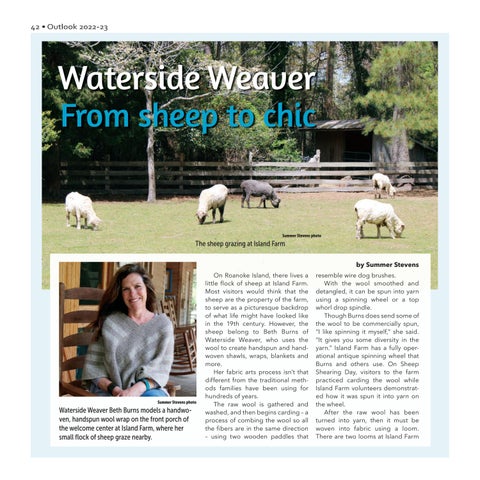4 2 • Outlook 2022-23
Waterside Weaver From sheep to chic
Summer Stevens photo
The sheep grazing at Island Farm by Summer Stevens
Summer Stevens photo
Waterside Weaver Beth Burns models a handwoven, handspun wool wrap on the front porch of the welcome center at Island Farm, where her small flock of sheep graze nearby.
On Roanoke Island, there lives a little flock of sheep at Island Farm. Most visitors would think that the sheep are the property of the farm, to serve as a picturesque backdrop of what life might have looked like in the 19th century. However, the sheep belong to Beth Burns of Waterside Weaver, who uses the wool to create handspun and handwoven shawls, wraps, blankets and more. Her fabric arts process isn’t that different from the traditional methods families have been using for hundreds of years. The raw wool is gathered and washed, and then begins carding – a process of combing the wool so all the fibers are in the same direction – using two wooden paddles that
resemble wire dog brushes. With the wool smoothed and detangled, it can be spun into yarn using a spinning wheel or a top whorl drop spindle. Though Burns does send some of the wool to be commercially spun, “I like spinning it myself,” she said. “It gives you some diversity in the yarn.” Island Farm has a fully operational antique spinning wheel that Burns and others use. On Sheep Shearing Day, visitors to the farm practiced carding the wool while Island Farm volunteers demonstrated how it was spun it into yarn on the wheel. After the raw wool has been turned into yarn, then it must be woven into fabric using a loom. There are two looms at Island Farm




















